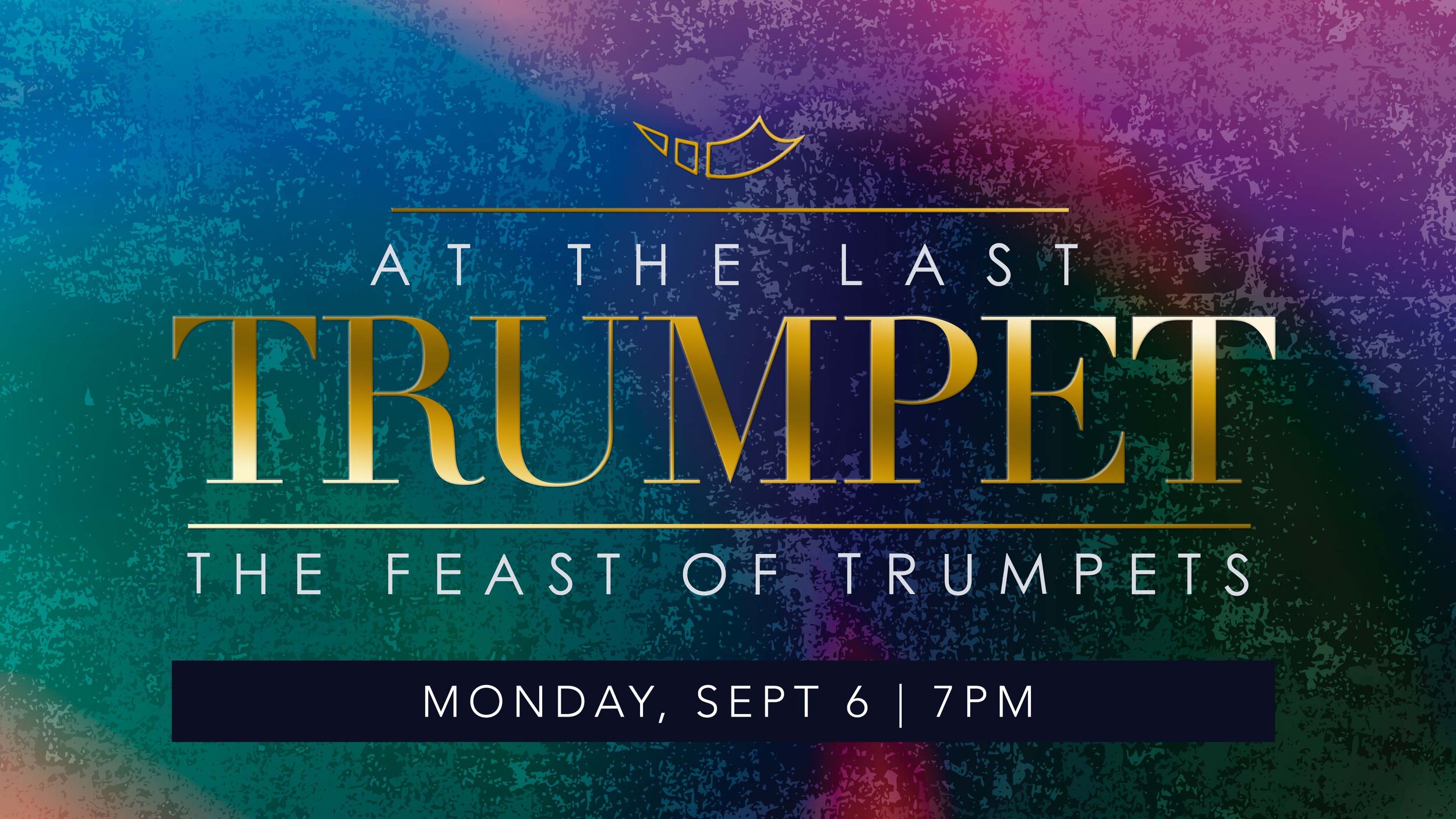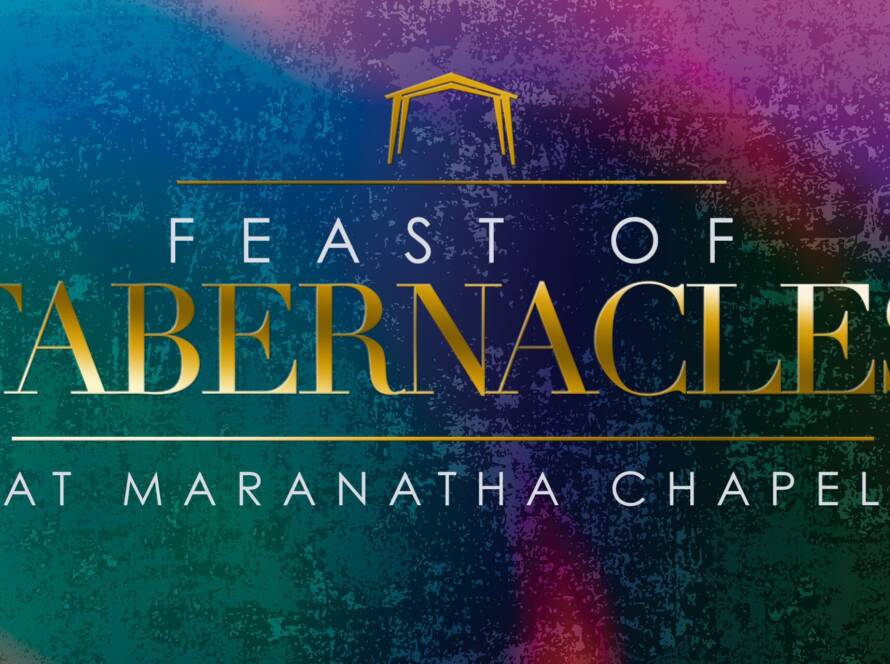
The sound of a trumpet is a powerful and recurring symbol in Scripture. When the Lord instituted the Feast of Trumpets, He was letting us know — something powerful and important is ready to happen!
I would love to have you celebrate this prophetic and joyous Feast with me this year.
Blessed are those who know the sound of the trumpet!
“Speak to the children of Israel, saying: ‘In the seventh month, on the first day of the month, you shall have a Sabbath-rest, a memorial of blowing of trumpets, a holy convocation’” (Leviticus 23:24).
The Feast of Trumpets, also called Rosh Hashanah or Yom Teruah in Hebrew, is the first of the Fall Feasts of the Lord. Teruah, traditionally understood as the blowing of a ram’s horn, is also translated as joyful noise or sound, as in Psalm 89: “Blessed are the people who know the joyful sound!” (verse 15).
A shofar is the ram’s horn trumpet of Israel.
I love what Zola Levitt, a Jewish believer who is now with the Lord, said concerning this feast:
“The trumpet was the signal for the field workers to come into the Temple. The High Priest actually stood on the southwestern parapet of the Temple and blew the trumpet so that it could be heard in the surrounding fields. At that instant, the faithful would stop harvesting, even if there were more crops to bring in, and leave immediately for the worship services.” 1
The Feast of Trumpets paints a beautiful picture of the rapture of the church:
“For the Lord Himself will descend from heaven with a shout, with the voice of an archangel, and with the trumpet of God. And the dead in Christ will rise first. Then we who are alive and remain shall be caught up together with them in the clouds to meet the Lord in the air. And thus we shall always be with the Lord. Therefore comfort one another with these words “(1 Thessalonians 4:16-18).
When that trumpet or shofar sounds, the greatest miracle since Jesus rose from the dead will take place: “We will not all sleep, but we will all be changed—in the twinkling of an eye, at the last trumpet… the dead will be raised incorruptible… For this corruptible must put on incorruption, and this mortal must put on immortality” (1 Corinthians 15:51-53).
On the seventh new moon of the year, in the month of Tishri, the Feast of Trumpets signals the end of the harvest for the last two thousand years. The trumpet sounds and the workers are called in to celebrate. “I looked, and behold, a door standing open in heaven. And the first voice which I heard was like a trumpet speaking with me, saying, ‘Come up here, and I will show you things which must take place after this’” (Revelation 4:1).
Why the Feast of Trumpets Is Unique
The Feast of Trumpets is the only Jewish celebration that occurs on the first day of the month, at the new moon, when the moon is dark except for a thin crescent. All other Jewish holidays occur later in their respective months when the moon is bright. In ancient Israel the new moon was normally celebrated by short trumpet blasts, but the New Moon of Tishri was celebrated by long trumpet blasts, signifying the uniqueness and sacredness of the seventh month.2
After the Diaspora, when Jews were scattered all over the world, Rosh Hashanah began to be celebrated over two days so that the Jews living in different time zones could be included. They began to call it “one long day.” The Feast of Trumpets became a mystery. No one could say the exact day or hour it began.
Blowing the Shofar
God instructed Moses to “make two silver trumpets for yourself…you shall use them for calling the congregation and for directing the movement of the camps” (Numbers 10:2). By Solomon’s time, 120 priests sounded silver trumpets in the temple (see 2 Chronicles 5:12).
But the shofar is the trumpet used for the Feast of Trumpets. The sound of the shofar carries memories for Jews of their origins and history.
When Abraham, in obedience to God, took his son Isaac to the top of Mount Moriah to offer him as a sacrifice, an angel held him back. A ram caught in the bushes became the substitute offering. That is why a ram’s horn is a powerful reminder of Isaac’s deliverance and Abraham’s obedience—and how their story foreshadowed the sacrifice of our heavenly Father’s Son (see Genesis 22:10–14).
The ram’s horn has since trumpeted momentous Jewish events. From war to celebrations, from Joshua’s victory at Jericho to “proclaim liberty throughout all the land to all its inhabitants” in the Year of Jubilee (Leviticus 25:10)— the same words inscribed on the Liberty Bell in Philadelphia.
Perhaps one year very soon, on a Feast of Trumpets, the Lord will descend with a shout, blow the shofar of God, and take the church home in a glorious instant. And we will be spared as Isaac was!
The Next Event
The Feast of Trumpets foreshadows the next event to be fulfilled on the prophetic calendar. This feast tells us about the fulfillment of the ancient prophets’ visions surrounding the rapture of the church. The trumpet is poised, ready to herald the end of the summer harvest.
Rosh Hashanah, which in Hebrew means “head of the year,” is known by various Hebrew idioms in addition to the Feast of Trumpets: the Wedding of the Messiah, the Hidden Day, the Time of Jacob’s Trouble, the Day of the Awakening Blast, the Day of Judgment, and the Coronation of the Messiah. Even these alternate names for the observance tell us something about this feast and what it means.
The Wedding Of Messiah
“Blow the trumpet in Jerusalem!… Call the people together.… Call the bridegroom from his quarters and the bride from her private room” (Joel 2:15–16, NLT). A royal wedding is announced by trumpets, and the wedding is blessed under the traditional canopy. 3
Marriages in ancient Israel were arranged by the parents, like Abraham did for his son, Isaac. Typically the bridegroom would go to the house of the bride-to-be and bring three things: the wedding contract, a skin of wine, and the bride price. If the father approved the bride price, the young man declared his vows of love, and a glass of wine was poured. If the woman said “yes” the betrothal contract became a legal document, a ketubah. Their status changed to “betrothed” and they were legally married, though the wedding ceremony was still some time away.
With transactions complete, the young bridegroom told his betrothed he was going away to build their bridal chamber.
When the chamber was finished, he would return for her.
Who decides when the chamber is ready? The groom tells his bride that he does not know exactly when the wedding will begin. Only his father determines the day and hour (see Mark 13:32).
This is when the bride begins the wait for the day when her groom will come to capture her. She is confident of his return for two reasons: the vows he pledged and the price he paid. Meanwhile, she wears a veil to signify that she is taken.
She receives regular progress reports about her new home. The foundation is laid. The walls are up. The doors are hung. Now the roof! Her excitement grows. Any day her beloved will come. She gathers her closest friends, and they begin watching through the night, two by two, waiting to hear the shouts of young men as they race toward her father’s home (see Matthew 25:6–7). This gives her just minutes to wake up, ready to be “raptured” from her own home.
Traditionally the Jewish father waited until the middle of the night when his son was fast asleep and tired from all his hard work. I can picture the proud father gently shaking his son and whispering, “It’s time.” Time to claim his bride.
When Jesus told His disciples, “If I go and prepare a place for you, I will come again and receive you to Myself” (John 14:3), He was giving the speech of a Jewish bridegroom. He paid the ultimate bride price. “Knowing that you were not redeemed with corruptible things, like silver or gold…but with the precious blood of Christ, as of a lamb without blemish and without spot” (1 Peter 1:18–19).
He gave us our ketubah (our contract) through the promises in His Word, and He invites us to the most glorious wedding that will ever take place (Revelation 19:7–9). “Blessed are those who are called to the marriage supper of the Lamb!” (verse 9).
The Hidden Day
Because no one could know the exact day of Rosh Hashanah (remember, it was celebrated over a two-day period), it was also called the Hidden Day (Yom HaKeseh). The term keseh or keceh is derived from the Hebrew root kacah, which means “to conceal, cover, or hide.”
When Jesus said, “No one knows about that day or hour” (Matthew 24:36, niv), He meant the day of His return is unknown. But in another layer of meaning, to the Jewish mind, He was also using an idiom for Rosh Hashanah, the “hidden day.” 4
Four times in the New Testament we read, “I am coming as a thief.”
“I will come upon you as a thief, and you will not know what hour I will come upon you,” “the day of the Lord will come as a thief in the night,” “the day of the Lord so comes as a thief in the night” (Revelation 16:15; 3:3; 2 Peter 3:10; 1 Thessalonians 5:2).
A thief does not arrive when you expect him. Instead, it’s indefinite, just like a Jewish wedding! An unexpected arrival at an unknown time.
Alfred Edersheim, a nineteenth-century Jewish believer, wrote many wonderful books connecting the Scriptures to their Jewish background. In one he explained why the high priest was called a thief in the night. Originally, God supernaturally ignited the holy fire on the temple altar. Afterward, at least two priests constantly minded the flame to make sure it never went out. The high priest would occasionally make rounds during the night to ensure the priests had not fallen asleep. If they did, God forbid, the high priest would take fire from the altar and light the sleeping priests’ garments; they would awaken with a fright, tearing their burning clothes off, exposing their nakedness. 5
Now read Jesus’ words: “Behold, I am coming as a thief. Blessed is he who watches, and keeps his garments, lest he walk naked and they see his shame” (Revelation 16:15).
We do not know the day or hour of His return, but we can hold fast and tend the flame of our faith, that it may never die.
The Time of Jacob’s Trouble
Remember that Rosh Hashanah falls in the darkest part of the lunar cycle. The fulfillment of the Feast of Trumpets sets the stage for the tribulation on earth, the Day of the Lord, when God’s wrath will be poured out on Israel’s enemies and the world will be brought to judgment.
Zephaniah and Amos described days of darkness and gloominess (Zephaniah 1:15; Amos 5:20). Further, the dark moon of Rosh Hashanah foretells Joel’s prophecy:
The sun shall be turned into darkness,
And the moon into blood,
Before the coming of the great and awesome day of the Lord.
And it shall come to pass
That whoever calls on the name of the Lord
Shall be saved. (Joel 2:31–32)
Oh, the hope that last line gives! Judgment will bring redemption and a fulfillment of the Abrahamic Covenant when, as Paul prophesied, “All Israel will be saved” (Romans 11:26).
The Coronation of Messiah
The custom regarding new kings of Israel and Judah required that they be enthroned on the first day of Tishri, the seventh month—the Feast of Trumpets. This feast foreshadows the coronation of the Messiah. Daniel wrote, “I watched till thrones were put in place.… The court was seated, and the books were opened” (7:9–10). Judgment day had come, just as Rosh Hashanah warns. But look what follows:
One like the Son of Man,
Coming with the clouds of heaven!…
Then to Him was given dominion and glory and a kingdom,
That all peoples, nations, and languages should serve Him. (verses 13–14)
In Revelation 4:1–11, John described the ultimate coronation after judgment. He heard a voice “like a trumpet” just before he was taken up “in the Spirit” and brought before a throne illuminated by a rainbow of jewels and a crystal sea. The One who sat upon the throne shone like jasper and sardius. Four living creatures (with faces of a lion, ox, eagle, and man) and twenty-four elders fell before Him, worshiping, casting their crowns, and giving glory and honor and thanks, saying:
You are worthy, O Lord,
To receive glory and honor and power;
For You created all things,
And by Your will they exist and were created. (Revelation 4:11)
The Feast of Trumpets heralds the glorious commencement of the Kingdom of God on earth.
It is a time to rejoice and celebrate!
All are welcome!
Maranatha Chapel, Monday, September 6, 7:00 pm
- Zola Levitt, The Seven Feasts of Israel (Dallas, TX: Zola Levitt Ministries, 1979, 2012), 12.
- See Marvin Rosenthal and Kevin Howard, The Feasts of the Lord (Nashville, TN: Thomas Nelson, 1997), 105.
- James Strong, Abingdon’s Strong’s Exhaustive Concordance of the Bible (1894, reprint, Nashville, TN: Abingdon, 1986), 54, ref. 2646, from 2645, Hebrew and Chaldee Dictionary. The prophet Joel referred to a private room, which is the Hebrew word chuppah, or canopy.
- See Edward Chumney, The Seven Festivals of the Messiah (Shippensburg, PA: Treasure House, 1994), 138–39.
- See Alfred Edersheim, The Temple: Its Ministry and Services as They Were at the Time of Jesus Christ (1874, reprint, Grand Rapids, MI: Kregel, 1997).



